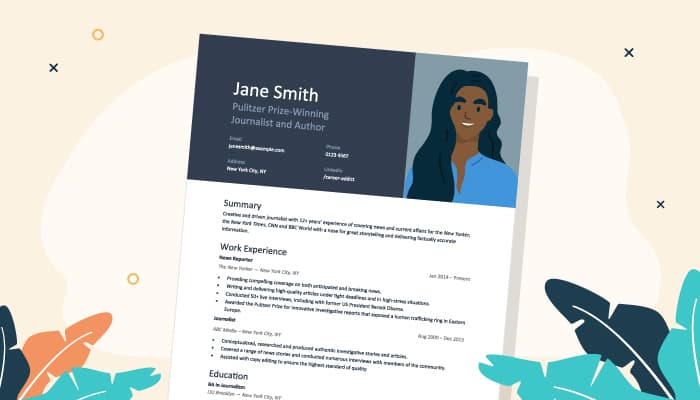In the world of literature, every word carries weight, and every sentence weaves a story. As an author, you’ve mastered the art of storytelling, but have you considered how to tell your own story effectively through your resume?
Creating a compelling author’s resume is a skill that can open doors to literary opportunities and showcase your unique talents. While some authors turn to professional resume writers Canada for guaranteed quality, others prefer to take the DIY route. Whichever path you choose, this informational article is your guide to mastering the art of crafting an author’s resume that shines.
In the pages that follow, we’ll explore the nuances of presenting your writing prowess, highlighting your achievements, and tailoring your resume to the publishing industry’s expectations. By the end, you’ll have the tools and insights needed to fashion a resume that reflects not only your writing journey but also your potential as a sought-after author.
Let’s embark on this journey to discover the tips and tricks that will help you craft a perfect author’s resume and set your literary career on an exciting trajectory.
Understanding the Author’s Unique Skill Set
Authors possess a distinct and remarkable skill set that sets them apart in the world of resumes. Your journey as a wordsmith has equipped you with a toolbox of talents that, when showcased effectively, can transform your resume into a literary masterpiece. Let’s delve into the components of this unique skill set:
Literary Artistry
Wordsmithing Expertise: As an author, you are a master of language, wielding words with precision and creativity. Your resume should reflect your ability to craft compelling narratives, engaging content, and error-free prose.
Storytelling Prowess
Narrative Craftsmanship: Storytelling isn’t just for books; it’s a valuable skill in any profession. Highlight your talent for constructing narratives that captivate readers and potential employers alike.
Attention to Detail
Meticulous Editing: Authors are meticulous about every word choice and sentence structure. This attention to detail extends to your resume, where errors can be costly. Showcase your proofreading skills and commitment to perfection.
Research Aptitude
In-Depth Research: Authors are adept at delving into diverse topics for their writing. Demonstrate your research abilities, emphasizing your capacity to gather and synthesize information, a valuable asset in many industries.
Creativity and Imagination
Innovative Thinking: Creativity is your forte. Use it to think outside the box when crafting your resume, making it visually appealing and unique without sacrificing professionalism.
Time Management
Meeting Deadlines: Authors are accustomed to working under deadlines, a crucial skill in any job. Communicate your ability to manage time effectively and meet project milestones.
Adaptability
Flexibility in Writing Styles: Your capability to switch between different genres and writing styles demonstrates adaptability. Emphasize your capacity to adapt to new challenges and writing tasks.
Collaboration Skills
Collaborative Authorship: If you’ve co-authored books or worked with editors, highlight your teamwork and communication skills, essential in most workplaces.
Understanding and showcasing these unique skills on your author’s resume will not only set you apart but also demonstrate to potential employers that you possess a versatile and valuable skill set. In the following sections, we’ll explore how to harness these abilities to create a resume that resonates with the publishing industry and beyond.
Resume Essentials for Authors
Crafting your author’s resume is akin to writing the opening chapter of your professional journey. To ensure it captures the reader’s attention, here are some essential elements to weave into your literary document:
1. Engaging Opening Statement
Begin with an engaging author bio that encapsulates your writing journey concisely. Think of it as the enticing prologue to your resume.
2. Showcasing Literary Achievements
Highlight your published works, including books, articles, and any other published content. Mention literary awards, accolades, and recognition to underscore your literary prowess.
3. Writing Style and Tone
Maintain a professional yet engaging tone throughout your resume. Let your writing style shine through, but keep it relevant and tailored to your target audience.
4. Detailed Work History
Include your writing-related work experience, freelance gigs, and any roles that demonstrate your skills. Elaborate on your contributions, emphasizing how they tie into your authorial journey.
5. Education and Training
Mention relevant degrees, certifications, and writing courses that have contributed to your development as an author. This section should reinforce your qualifications.
6. Testimonials and References
If available, include endorsements or references from fellow authors, editors, or collaborators who can vouch for your writing abilities.
7. Online Presence
Include links to your author website, blog, or social media profiles. These can serve as an extended portfolio, showcasing your online presence and engagement with your audience.
Tailoring Your Resume for the Publishing Industry

Adapting your resume for the publishing industry requires a keen understanding of the field’s nuances. Here’s how to tailor your resume for a successful reception within this literary realm:
1. Emphasize Literary Awards
Highlight any literary awards, nominations, or recognitions you’ve received. This demonstrates your credibility as an author and piques the interest of publishing professionals.
2. Showcase Editing and Proofreading Skills
Incorporate your keen eye for detail by showcasing your editing and proofreading abilities. Mention instances where your editorial contributions enhanced a project.
3. Networking Strategies
Underline your networking skills and connections within the publishing world. Mention any writing groups, associations, or literary events you’ve been a part of.
4. Publishing Credits
List your published works prominently. Mention the genres, themes, and styles you’re comfortable with, showcasing your versatility as a writer.
5. Query Letters and Book Proposals
If applicable, include examples of successful query letters or book proposals. These demonstrate your ability to pitch ideas effectively.
6. Industry Knowledge
Highlight your familiarity with the publishing industry’s trends, market dynamics, and emerging authors. This underscores your commitment to the field.
7. Literary Agent or Publisher Contacts
If you have existing relationships with literary agents or publishers, mention them discreetly. These connections can be invaluable in the publishing industry.
By customizing your author’s resume with these industry-specific elements, you’ll position yourself as an author who not only writes well but also understands the intricacies of the publishing landscape.
Conclusion
Crafting the perfect author’s resume is a vital step in your publishing journey. It’s not just about listing achievements; it’s about telling your unique story as a writer. With a well-crafted resume, you’ll stand out in the competitive world of publishing, attracting publishers, literary agents, and readers alike. So, remember, your resume is not just a summary of your past; it’s a roadmap to your future success as an author.
FAQ
Q1. What’s the importance of an author’s resume in the publishing industry?
A1. An author’s resume is crucial in the publishing industry as it serves as your professional introduction. It showcases your writing skills, experience, and unique voice to publishers, literary agents, and potential readers. A well-crafted resume can open doors to publishing opportunities and help you stand out in a competitive field.
Q2. Should I include unpublished works on my author’s resume?
A2. Yes, including unpublished works, such as completed manuscripts or works-in-progress, can demonstrate your commitment to your craft. Be sure to specify the status of these projects and any positive feedback or interest they have received.
Q3. How can I tailor my author’s resume for different publishers or genres?
A3. To tailor your resume effectively, research the specific publisher or literary agent’s preferences and the genre they specialize in. Highlight relevant writing experience, skills, and published works that align with their interests. Customize your author’s bio to resonate with their target audience.

